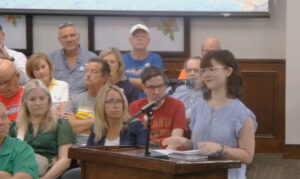The Peachtree City Council is poised to adopt a slightly lower millage rate for the upcoming fiscal year at its regular meeting Thursday night.
While that will give a slight property tax break to most citizens, council will also begin to delve into how the city will shore up its future needs of $1.5 million a year for road and cart path maintenance.
Since 2004, that funding came from the city’s share of the 2003 countywide transportation Special Local Option Sales Tax. But those funds dried up this year, and the city dipped into its cash reserves a modest amount to cover necessary road paving for the coming 2013-2014 fiscal year.
City Councilman Eric Imker is pushing the issue, having developed a spreadsheet containing a variety of options for council to consider. Imker contends the city needs to know all its options, which include of course a potential increase in the city’s millage rate next year.
There is also a chance that Fayette voters will approve a 1 percent SPLOST for two years this November, and by Imker’s estimation the city’s revenues from that could fund the city’s road and cart path maintenance needs for between seven and 10 years, costing a total of between $300 and $400 for the average Peachtree City homeowner by Imker’s estimation. Raising the millage rate by .85 mills would raise the necessary $1.5 million a year and cost the average homeowner about $81 a year.
If the sales tax fails to pass, however, the city could cut $1.5 million by “reducing city services” or simply waiting on future tax digest increases, as every 2 percent in digest growth nets the city an additional $235,000 a year in revenue, according to Imker.
Another option involves a general obligation bond that would need voter approval, would cost $62 a year over 10 years and would fund the city’s maintenance needs for between five and seven years, according to Imker.
Imker notes that the sales tax is ultimately the least-expensive option, as it would cost homeowners between $300 and $400 total over two years as opposed to $620 over 10 years for the general obligation bond funding or $810 if the millage rate-only increase holds up for ten years.
Yet another funding option that would have a limited effect is a potential use of the city’s excess amount of cash reserves, which are required to be an amount equal to 20 percent of the city’s annual budget but are currently hovering around 35 percent. Using the cash reserves would only fund about two years’ worth of road and cart path maintenance by Imker’s calculations.










Leave a Comment
You must be logged in to post a comment.